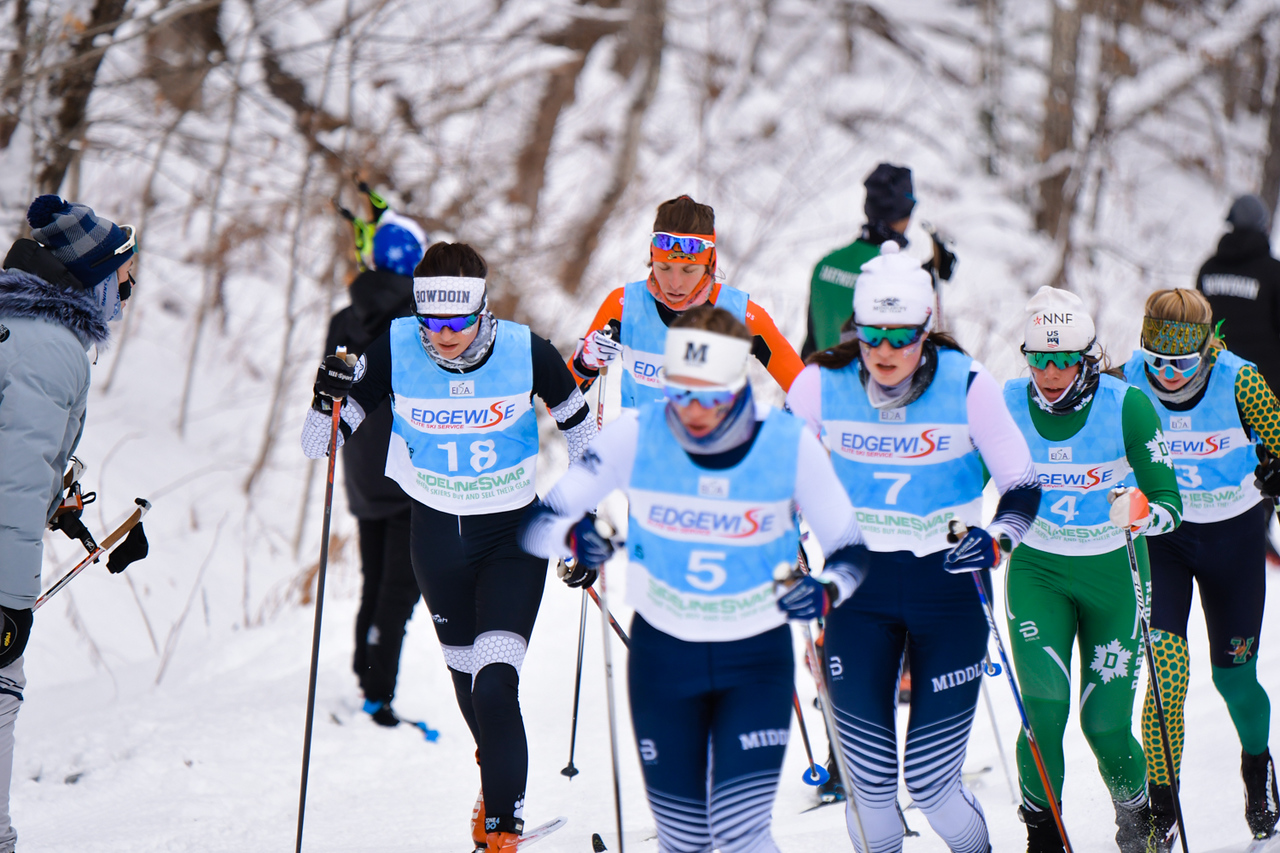Nordic starts season off with historic result
January 24, 2020
 COURTESY OF TODD ANDERSON
COURTESY OF TODD ANDERSON
Considering this is only the first carnival of the young 2020 season, these exceptional results bode well for the rest of the winter. Starting so strong is unusual for Bowdoin’s Nordic teams, which have historically begun the season at a slower clip before gaining momentum leading up to the end of the season.
“We typically expect we’ll be at our best in late February, hopefully at NCAA Championships in March, so for us to come out that hot … that’s never happened before. That’s a big deal,” said Head Coach Nathan Alsobrook.
In any given ski season, the idea of peaking at the right time—hopefully before NCAA Championships—is certainly on the team’s collective conscience. Such an outstanding first carnival might appear to upset the archetypical trajectory of a team adjusting to a new roster over the first few carnivals of the season before reaching its fastest towards the end of the winter.
“Is this our peak? Because if it isn’t, that could be really awesome,” said Ketchel. “Either way, if it is our peak, we have to maintain the peak, and if it’s not the peak, we have to work hard to peak more. Either way, it’s a really promising and exciting start, but it’s all about how we keep going from here.”
“It’s funny because we always joke about other teams peaking early,” said Vandendries. “So hopefully [we’re] not peaking early!”
Alsobrook emphasized the importance of recognizing the team’s exceptional success last weekend, but also staying centered and focused on season-long goals.
“Before we draw any real conclusions, let’s get some more races under our belt. We’ll see where things go [from there],” said Alsobrook. “[But] this is obviously really encouraging, and it validates all the training we’ve been doing.”
The Bowdoin Nordic team and college cross-country ski programs at large are subject to an especially short season—just eight weeks long from the first carnival over winter break to NCAA Championships in early March. Considering fall training begins in early autumn, well before the first snowflakes have fallen, the team puts in a tremendous amount of training throughout the year for just a few precious weekends of racing. As a result of this unique schedule, skiers must embrace the entire experience of college skiing.
“You really have to love the lifestyle and the whole process of being a Nordic ski racer,” said Alsobrook. “Because if you really only love the racing, that’s not a lot of payoff … it’s really all about the journey as well as the little race season we have.”
The brief racing season is only part of what Bowdoin’s Nordic skiers consider “in-season,” which consists of months of lifts, running and roller-skiing on roads before the first snow. That fall practice block makes up the majority of the athletes’ training.
“You have to love the whole process of training—the dryland, the running … going out and roller-skiing on a chilly fall morning—you’ve got to love the whole process,” said Alsobrook. “You’ve got to love being with the team, you’ve got to love the preparation and all of that.”
This weekend was particularly exciting for a few of the team’s newest members. Zach Ennis ’23, Peter Moore ’23 and Greta Bolinger ’23 all finished in the top 40 of an 88-athlete field, earning them NCAA qualifying points in their first ever collegiate carnival.
“[Results like that are] honestly something that we don’t take for granted from a first year,” said Alsobrook. “[A league like] ours values being older and having more years of experience under your belt, so that these three all stepped up and showed potential is encouraging to me. We have a great group of older skiers who can carry the load, but to know that … the next generation is already starting to assert themselves is just a really big confidence builder for them.”
Ketchel stressed that this past weekend’s performance, as well as all of the team’s performances, are a top-to-bottom effort dependent on not just race results of the scoring skiers but the camaraderie and support of the entire team.
“There are a lot of folks on the team this year that did not necessarily ski a lot … in high school, but that are really driven to improve and work really hard,” said Ketchel. “I think that’s a really big part of it—that work hard, train hard, ski fast mentality regardless of how fast [anyone is] skiing. The team’s also really good about focusing on the positive side—maybe someone didn’t have the weekend they were looking for, but they’re really excited about the rest of the team and driven to do better and keep a positive outlook.”
The team hopes to continue its early success today and Saturday at the University of Vermont Carnival, also in Craftsbury, Vt.. This weekend’s event will be much larger because the field includes not only college but also high school and post-collegiate athletes.
“This coming weekend is going to be pretty big because [our race] is combined with the Super Tour, which a lot of professional skiers race in, and also Eastern Tour, which a lot of high school skiers are at to qualify for nationals,” said Vandendries. “It’s going to be a really big race.”
Next weekend, Bowdoin will return to Maine to race at the Colby Carnival, located barely an hour away from campus. Student attendance is encouraged at this event where most of the northeastern college programs will compete in an exciting mass start race as the Polar Bears seek to build on this season’s unprecedented success.

Comments
Before submitting a comment, please review our comment policy. Some key points from the policy: